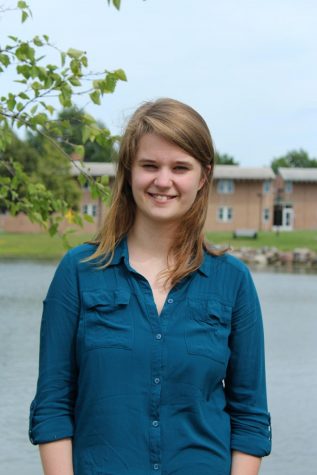Spread the facts, not rumors
On Thursday, Oct. 16 a female student was attacked around 10 p.m. as she was walking outside of the Kresge Library. Her attacker is said to be an “unknown male wearing a dark ‘hoodie’ style sweatshirt,” as the Oakland University Police Department first tweeted at noon two days later, when the victim filed a police report. That same day, the news reports began.
Now, six days after the student was assaulted, the headlines span the web: “Woman assaulted on Oakland University campus.”
“My heart goes out to Yari Martinez for getting attacked by a coward in a hoodie,” a student wrote on Oakland University’s Facebook page. “Get well soon.”
While the gesture is kind, the name mentioned is a problem.
The victim’s name was never released, according to OUPD Chief Mark Gordon; the name “Yari Martinez” could not be found on the police report because she was never involved with this case — she was not the victim. Yet the Daily Tribune originally reported otherwise. It has since been changed online, but where did the Daily Tribune first get this name?
It appeared to pull Martinez’s name from Channel 4 WDIV, who posted a report at 11 p.m. Oct. 18. In this video, the news station shared details of the assault and pounced on students walking outside of Kresge, asking them whether they felt safe on campus anymore.
Martinez happened to be one of those students, and in its rush to get the story online, the Daily Tribune made a grievous error when pulling from the report.
Another problem with these stories: they bring into focus something called the “knockout game,” in which assailants attempt to knock an unsuspecting victim unconscious in one hit.
This, news organizations are saying, could be the main motive in Thursday’s attack. But The Oakland Post fails to see how these organizations can know this as fact, and how giving it attention and coverage will help in finding the Kresge attacker.
“Police are not confirming whether it was part of a knockout game,” said Jane Park, reporter for WXYZ, in a video with the headline “Oakland University police investigate alleged ‘knockout’ attack on campus.”
This video, posted at 11:28 p.m. Oct. 18, also originally reported that the victim was hospitalized, another fabrication. While the wording has since been updated, it still reads she “sustained a concussion and a neck sprain.”
“The night that she got assaulted she drove herself home and then her parents took her to the hospital to be checked,” Gordon said.
The victim, who was showing signs of a concussion, went home and came back the next day when her head continued to hurt. A brain scan showed a mild concussion, but “she was never hospitalized for it.”
“Everyone is trying to make rhyme or reason out of what or why it’s happened,” Gordon said. “The media has done what they need to do with this to make a story of interest.”
This “making a story to interest,” rather than informing the public, is what we at The Oakland Post condemn. This sensationalizing, this racing to be first instead of correct is what tears down the work we do to bring people the truth of their surroundings. It’s what causes needless panic and negative discussion among OU, its stakeholders and the surrounding community.
Is this attack really part of the “knockout game?” How can something like that be truly known? Even if the attack is proven to be part of this deathly “game,” what will discussing it do other than spread the idea, potentially inspiring future attackers?
We can’t do anything about this game, and we can’t do anything by declaring campus suddenly unsafe for all students. We can, however, spread the right information and awareness so students are prepared for all circumstances. We can spread resources and ideas, not rumors.
While the WDIV’s original report shared safety tips for students and mentioned the emergency phones and 24/7 visual escort service OUPD provides, most of these other news outlets neglected to do so.
We at The Oakland Post commend those who ask the right questions and report the right facts, and condemn the other media organizations who are sensationalizing this assault and the knockout game in attempts to create a story that will garner attention.
We want to remind students that while this issue is serious, it has not drastically changed the situation at Oakland. This is still a safe campus. There has been an assault, whatever the motive, and action is being taken to find the attacker and prosecute him. What we, as students, must do is continue to stay vigilant, pay attention to the right things, and speak up when we see something suspicious. There is a difference between paranoia and vigilance, and we must recognize that difference.
Don’t be like the news outlets that are looking for the best story. Be vigilant. Be sensible. And above all, be safe.
Contact Managing Editor Kaylee Kean at [email protected].









